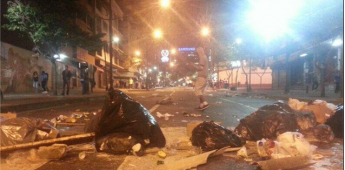
Pro-opposition university authorities and lecturers largely closed 18 of the country’s 61 universities on Thursday 22 May. The strike was part of a protest action that coincided with fresh incidents of street violence, including an attack on the youth wing of the United Socialist Party of Venezuela (JPSUV).
Earlier this week the Venezuelan Federation of University Professor Associations (FAPUV) ordered the one-day strike at the country’s autonomous and private universities. The country’s remaining 43 universities, many of these private or state run, stayed open.
Marches and other demonstrations by pro-opposition lecturers and students marked the strike. Keta Stephany, a FAPUV representative, argued to the press that the purpose of the strike was to demand the release of students arrested in connection with on-going opposition unrest in the country.
“Today we’re protesting for the freedom of 164 students in custody and around 3000 citizens arrested for protesting in the last 100 days…because of this the right to protest is being defended,” she said.
Authorities maintain that no one has been arrested for peacefully protesting, and that the arrests made have been against those committing violent acts ranging from alleged homicide to destruction of public property.
Of the roughly 3,000 people arrested since violent unrest began in early February, the vast majority have been released without charge or on bail conditions. At the beginning of May, the Attorney General’s office reported that 197 people were then held in custody to be charged with different violent crimes, only 14 of whom were students.
The Attorney General’s office’s latest report put the number of those in custody at 252, although it is not clear how many of these people are enrolled in a course of study.
When the opposition’s protest movement began in early February under the banner of “The Exit”, which was accused of trying to force the removal of Nicolas Maduro from the presidency, some peaceful demonstrations protested high crime rates and shortages of goods. Opposition protests have now also taken up the banner of “freedom” for those arrested in violent disturbances.
Meanwhile groups of opposition hardliners have perpatrated violent attacks on state officials and property to create chaos and force President Maduro’s resignation.
This violence includes destruction of university property, attacks on over 160 Cuban doctors, firebombing and other assaults on government offices, the destruction of 90 metro-buses and injury to 200 passengers, and the construction of now-dismantled barricades to try to paralyze urban life. The barricades appear responsible for a great number of the 42 deaths that have occurred in this period.
Most of the country has now returned to a normal state of affairs, although a more tense atmosphere and incidents of violence continue in hotspots such as the wealthy eastern neighborhoods of Caracas and student towns in the Venezuelan Andes to the west of the country.
Authorities are investigating 160 allegations of abuses by security forces during this period, 156 of which are for cruel treatment, two for torture and two for murder. Twenty four police and National Guard officers have been arrested or are being monitored ahead of trial in relation to the cases so far.
Pro-Bolivarian university sector rejects stoppage
While pro-opposition students and lecturers protested against the government yesterday, university workers, students and lecturer organisations aligned with the Bolivarian process rejected the strike. They argued that it was “political” and “contributed to right-wing actions to maintain control of the streets”.
Maryann Hanson, the rector of the government’s Bolivarian University of Venezuela (UBV), argued that the strike was “directed toward destabilising and conspiring actions”.
“To defend a group of students that have participated in violent actions is to link yourself to a situation where universities and child care centers have been burned and government employees assassinated,” she continued.
A group of two dozen pro-government student organisations released a statement making a similar argument and accusing pro-opposition university authorities of damaging the quality of higher education by constantly closing affected universities for political motives. They also claimed that the opposition did not offer proposals to advance university education.
“It’s evident that in our sector the educational gains [under the Bolivarian government] are incomparable with the opposition’s proposals, who wish to forge an exclusive education system in the hands of private property,” the statement read.
On-going violence
The opposition university strike, which included some peaceful protest activities, coincided with more violent street tactics, apparently by hard-line opposition activists.
Such actions included small street battles with police in the cities of Maracay and Mérida. In the student town of Mérida, the privately-owned newspaper Ultimas Noticias reported that three police officers and one student were wounded; three of these by firearms, and one police officer by a home-made rocket.
According to local press, the clash took place when masked opposition activists closed off a main city thoroughfare and robbed two buses, shortly after the opposition’s main street rally nearby. Security forces tried to clear the road and recover the buses, and there was a report that a pro-government armed group also appeared on the scene to confront the masked activists.
Meanwhile in Caracas, masked opposition activists erected new burning barricades in the wealthy Chacao area. Security forces reportedly used rubber pellets and tear gas the clear the right-wing militants and re-open the area.
Further, masked bands attacked the Caracas headquarters of the United Socialist Party of Venezuela’s youth wing (JPSUV) with Molotov cocktails, which burned some of the furniture inside. No one was reported injured.
Ricardo Moreno, a member of the JPSUV leadership, denounced the incident. “This is one more act of their violent agenda, we ask authorities to protect the physical safety of JPSUV members,” he said.
Following the day’s activities, members of the FAPUV have said they will continue monitoring the situation in the country and won’t discard the possibility of calling for fresh protest actions in the near future.




